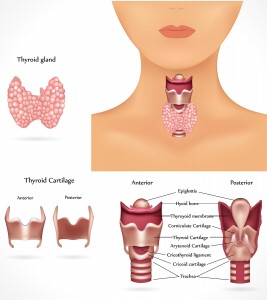 This is the third in a series of monthly posts about hypothyroidism. Please feel free to email your thyroid-related questions to jproodian@naturalhc.com or post them in the comments section at the bottom of this post and I’ll be happy to answer them.
This is the third in a series of monthly posts about hypothyroidism. Please feel free to email your thyroid-related questions to jproodian@naturalhc.com or post them in the comments section at the bottom of this post and I’ll be happy to answer them.
At Natural Healthcare Center, we take a comprehensive approach to the treatment of any condition as opposed to focusing on a single treatment option. In Part 2 of our series of posts covering hypothyroidism, we examined why acupuncture is one of many tools in our treatment arsenal.
Nutrition and diet also play an important role in diagnosing and treating hypothyroidism. We are very fortunate that Dr. Oscar Coetzee, PhD, a top-notch clinical nutritionist, is part of the Natural Healthcare Center family, and I’m grateful for Dr. Coetzee’s contributions to this post.
A significant amount of clinical data collected during the past six months or so suggests that various inflammatory foods can have an adverse effect on the thyroid. Research is ongoing, but we’ve seen positive changes when gluten is eliminated for three to six months from the diet of people who are dealing with hypothyroidism.
The two other most common contributors to hypothyroidism are an excess of artificial sweeteners and a soy-heavy diet, especially processed soy because most of it is genetically modified. We believe this has to do with how these toxins change the expression of DNA within the cells, resulting in an adverse effect on the thyroid.
We focus on eliminating inflammatory foods and toxins that will help to regulate the thyroid as opposed to inducing other nutrients through supplementation. There are many thyroid supplements on the market, but if you don’t eliminate the causes of inflammation from someone’s diet, you’re not really fixing the problem.
We commonly prescribe a Paleolithic diet, which eliminates grains, dairy and soy while emphasizing whole vegetables, fruits, nuts and lean animal protein. However, every patient is unique and there are a number of diets that are anti-inflammatory, which is why you need a respected clinical nutritionist like Dr. Coetzee to point you in the right direction.
We view hypothyroidism as part of a chain reaction in the body. In other words, something else likely went wrong before the thyroid became a problem. Instead of focusing on just the thyroid, we need to examine all of the connections between all of the body’s organ systems that flow together. Hypothyroidism is the result of a systemic problem that’s not isolated to the thyroid.
Good nutrition plays a critical role in every aspect of our health, and the proper function of the thyroid is no exception. This is the year of the family. If we’re serious about taking back our health and doing our part to take on hypothyroidism, a smart diet must be part of the equation.
In future posts in our hypothyroidism series, we’ll discuss other treatment options and leading causes of the disease. Again, if you have a thyroid-related question, please post it below in the comments section, or email me privately at jproodian@naturalhc.com.
Dr. James Proodian is an accomplished chiropractic physician and health educator who founded Proodian Healthcare Family of Companies to help people feel better, function better, and live longer. His expertise for the past two decades has been in physical rehabilitation, and he has successfully established himself as a spinal specialist. In his practice, he advocates the science of functional medicine, which takes an integrative approach to treating patients by addressing their physical, nutritional, and psychological needs. Alarmed by the escalation of complex, chronic illness in our country, Dr. Proodian has been speaking to companies and organizations through his “Wellness at Work” program since 1994, motivating thousands of people to make positive lifestyle choices and lead healthier, more productive lives. He can be heard weekly on his radio program, “Proodian Healthcare By Design,” on Tandem Radio.